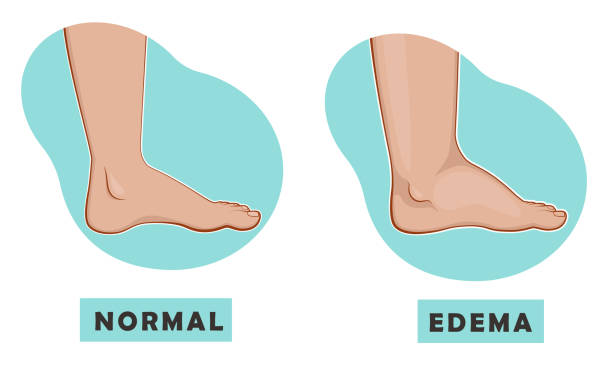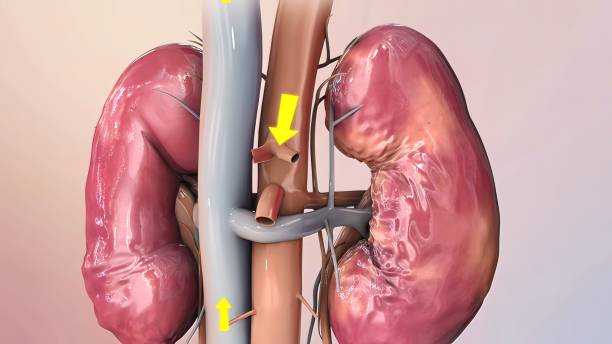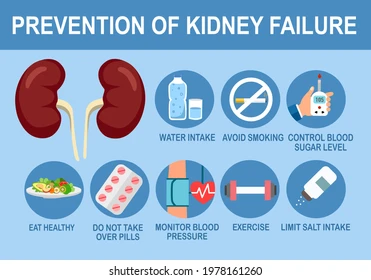Kidney disease is a serious condition that, if left untreated, can lead to severe health complications including renal failure. It is important to understand the causes, symptoms and preventive measures associated with kidney disease. Knowing how to recognize the early warning signs of kidney disease is key to preventing it from progressing and managing the condition in its early stages. By making healthy lifestyle choices and understanding the risk factors associated with this condition, we can take steps to reduce the risk of developing kidney disease. This article will provide an overview of the causes, symptoms and prevention of kidney disease.
What is kidney disease?
When the kidneys are damaged or diseased, they can no longer function properly. Kidney disease can be acute or chronic, with the former being the early stage of a chronic condition. Some of the signs of kidney disease include blood in the urine, swelling in the legs and abdominal pain. In chronic kidney disease, the kidneys become less effective at filtering out waste products from the blood, which can lead to higher risk of serious health complications if left untreated. Chronic kidney disease can lead to end-stage renal disease if not treated. This means that the kidneys will no longer be able to function and will require dialysis or a kidney transplant to replace their function. Symptoms of kidney disease include fatigue, nausea, vomiting and swelling in the legs, abdomen or feet. Kidney disease occurs when the kidneys no longer function properly, either due to a disease process, an injury or a congenital disorder. There are many factors that can contribute to kidney disease, including high blood pressure, diabetes, obesity and family history.
Causes of kidney disease
There are a number of causes of kidney disease, including high blood pressure, diabetes, obesity, and a family history of kidney disease.
- High blood pressure - High blood pressure is one of the most common causes of kidney disease. If blood pressure remains uncontrolled for many years, it can result in progressive damage to the blood vessels in the kidneys, resulting in kidney disease.
- Diabetes - Diabetes is a common cause of kidney disease. The kidneys of people with diabetes may be damaged as a result of reduced blood flow and nerve damage due to high blood sugar levels that remain uncontrolled over time.
- Obesity - Obesity is another common cause of kidney disease. Being overweight places strain on the kidneys, which may respond to this extra pressure by reducing their ability to filter toxins and waste products out of the body, which can lead to kidney disease.
Reference Source
Symptoms of kidney disease
The severity of the symptoms associated with kidney disease will depend on the level of damage to the kidneys and the rate of progression of the condition. Some of the common symptoms of kidney disease include blood in the urine, swelling in the legs and abdominal pain.
- Blood in the urine - Blood in the urine is a common symptom of kidney disease. It may appear as a red or pink colour in the toilet bowl, or there may be traces of blood in the stream. It is important to note that blood in the urine is not always a sign of kidney disease and many other conditions can cause it, including urinary tract infections and sexually transmitted diseases.
- Swelling in the legs - Swelling in the legs is another symptom of kidney disease. It can be a sign of a condition called edema in which the body retains too much fluid, resulting in swollen or painful legs.
- Abdominal pain - Abdominal pain is a common symptom of kidney disease. It is often described as a dull ache or cramping sensation in the lower abdomen.

Risk factors of kidney disease
Kidney disease is a serious condition that, if left untreated, can lead to severe health complications including renal failure. Some of the factors that can increase your risk of developing kidney disease include high blood pressure, diabetes, obesity and a family history of kidney disease.
- High blood pressure - High blood pressure is one of the most common causes of kidney disease. If blood pressure remains uncontrolled for many years, it can result in progressive damage to the blood vessels in the kidneys, resulting in kidney disease.
- Diabetes - Diabetes is a common cause of kidney disease. The kidneys of people with diabetes may be damaged as a result of reduced blood flow and nerve damage due to high blood sugar levels that remain uncontrolled over time.
- Obesity - Obesity is another common cause of kidney disease. Being overweight places strain on the kidneys, which may respond to this extra pressure by reducing their ability to filter toxins and waste products out of the body, which can lead to kidney disease.
Reference Source
Diagnosis of kidney disease
- Blood tests - Your doctor may recommend a blood test to determine your kidney function. This can help to identify early signs of kidney disease, such as protein in the urine and reduced kidney filtration.
- Urinalysis - A urinalysis can help to identify signs of kidney disease such as protein in the urine and blood in the urine.
- Imaging scans - Imaging scans such as an ultrasound or CT scan can help to detect abnormalities in the kidneys.
Treatment of kidney disease
- Controlling risk factors - The best way to treat kidney disease is to control the risk factors. For example, if you have high blood pressure, you will need to take steps to reduce this condition.
- Dietary changes - Changing your diet and eating more fruits and vegetables can help to reduce your risk of developing kidney disease.
- Medications - Your doctor may recommend certain medications that can help to control the progression of kidney disease.
Prevention of kidney disease
Kidney disease is a serious condition that, if left untreated, can lead to severe health complications including renal failure. There are a number of ways to reduce your risk of developing the condition, including eating a nutritious diet, exercising regularly and managing any existing medical conditions.
- Healthy diet - A healthy diet is the first step to preventing kidney disease. Fruits and vegetables are particularly beneficial for reducing the risk of this condition.
- Regular exercise - Exercising regularly has many health benefits, including reducing your risk of developing kidney disease.
- Managing other medical conditions - If you have another chronic condition, such as diabetes or high blood pressure, you should take steps to manage it. This can reduce the risk of developing kidney disease.
Lifestyle changes to reduce the risk of kidney disease
- Maintaining a healthy weight - Maintaining a healthy weight can help to reduce the risk of kidney disease. Eating a nutritious diet and exercising regularly can help you to achieve and maintain a healthy weight.
- Eating healthily - A diet rich in fruits and vegetables can protect against a number of health conditions, including kidney disease.
- Quitting smoking - Smoking can lead to many health conditions, including kidney disease. Quitting smoking can reduce your risk of developing this condition.
Support for those with kidney disease
If you are diagnosed with kidney disease, you may need to make some lifestyle changes to reduce the risk of further damage to the kidneys. This can be challenging when you have a busy lifestyle and may not have the energy to exercise as much as you would like. However, it is important to take action to reduce your risk of complications associated with kidney disease, including high blood pressure and diabetes. If you have been diagnosed with kidney disease, it is important to speak with your doctor about which lifestyle changes you need to make, as well as any dietary restrictions you need to follow. Furthermore, it is recommended that people with kidney disease receive support to help them adapt to their new lifestyle. This can help you to manage your condition and lead a more fulfilling life.
Reference:
https://www.nhs.uk/conditions/kidney-disease/
https://www.webmd.com/a-to-z-guides/understanding-kidney-disease-basic-information
https://www.mayoclinic.org/diseases-conditions/chronic-kidney-disease/symptoms-causes/syc-20354521
https://www.webmd.com/a-to-z-guides/understanding-kidney-disease-basic-information
https://en.m.wikipedia.org/wiki/Kidney_disease


Fantastic work by you, It's very necessary for us to visit the hospital at least once in a month to check our kidney functioning.
I am glad to you🥰
Thanks for your contribution to the STEMsocial community. Feel free to join us on discord to get to know the rest of us!
Please consider delegating to the @stemsocial account (85% of the curation rewards are returned).
Thanks for including @stemsocial as a beneficiary, which gives you stronger support.